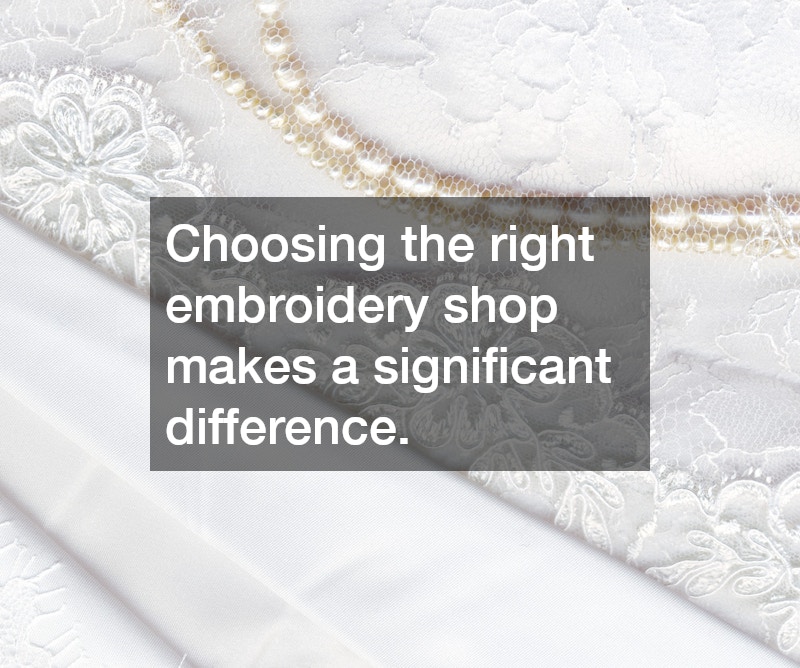Understanding how to choose embroidery shops is essential for ensuring high-quality results. This article explores key factors to consider when evaluating embroidery service providers. By focusing on certain aspects, you can ensure that the final product meets your expectations and requirements.
1. How to Determine the Quality of an Embroidery Shop?
Assessing the Portfolio of Work
Reviewing a shop’s portfolio is crucial for understanding its level of craftsmanship. It offers a glimpse into their versatility and ability to handle different styles and types of embroidery. A diverse portfolio often indicates a robust experience in the industry, enhancing confidence in their skills.
Pay attention to the variety and complexity of the designs showcased. This not only reflects the shop’s expertise but also their willingness to take on unique and challenging projects. Additionally, consistent quality across different projects signifies reliability and attention to detail.
Ask if the portfolio includes client collaborations. This will give insight into their experience working with diverse customer requirements and design concepts. Furthermore, it demonstrates their ability to adapt to client needs and bring their visions to life.
Evaluating the Equipment Used
Modern technology plays a critical role in embroidery quality. Advanced machinery ensures precision, consistency, and efficiency in creating embroidered products. Investing in up-to-date equipment also reflects the shop’s commitment to delivering high-standard work.
Ask about the types of machines in use, such as multi-head embroidery machines or automated systems. These technologies allow for intricate designs and faster production, which is advantageous for bulk orders. Current software also aids in creating accurate digital patterns and smoother execution.
Additionally, inquire about the maintenance schedule for their machinery. Regular upkeep is necessary to maintain optimal performance and avoid technical issues during production. This diligence further assures customers of reliability and quality assurance.
Checking Customer Reviews and Testimonials
Customer reviews are invaluable for gaining insights into an embroidery shop’s reputation. They provide first-hand accounts of satisfaction levels, professionalism, and service quality. Positive reviews often correlate with consistent and satisfactory client experiences.
Search for testimonials on multiple platforms, including social media and business directories. Pay attention to feedback on delivery times, communication, and problem-solving capabilities. This comprehensive approach will help in forming a balanced view of the shop’s performance.
Moreover, look for common themes or patterns within the feedback. Recurring complaints or praise might indicate specific strengths or weaknesses. Engaging with previous clients directly can sometimes provide deeper insights and detailed recommendations.
2. What Services and Customization Options Do Embroidery Shops Offer?
Range of Embroidery Techniques
Exploring a shop’s range of embroidery techniques reveals its ability to cater to diverse needs. Techniques such as monogramming, crests, and 3D puff embroidery offer unique textures and details. A shop with a wide array of techniques can accommodate custom and varied design requests.
Each technique has distinct characteristics that may affect the look and feel of the final product. Understanding these nuances can aid in making informed choices about what best suits your project. Shops that master multiple techniques typically exhibit greater versatility and adaptability.
Inquire whether the shop can perform intricate and specialized stitches like satin or fill stitches. These details can contribute significantly to the visual appeal and durability of the embroidery. A willingness to expand their technique repertoire indicates a proactive approach to customer satisfaction.
Material and Thread Choices
Material and thread selections are crucial to achieving the desired finish in embroidery. A varied selection of fabrics and threads allows for a personalized and tailored final product. Options like cotton, polyester, and silk can affect the durability and appearance of the embroidery.
Different threads offer varying gloss and texture, impacting the aesthetic outcome. For instance, metallic threads provide a luxurious sheen, while matte threads suit a more subtle look. It’s important to discuss these choices with the shop to ensure alignment with your vision.
Additionally, the quality of materials directly impacts the longevity of the embroidered item. High-quality threads and fabrics resist wear and fading, maintaining the design’s vibrancy over time. A good shop should provide guidance on the best materials for different applications.
Design Consultation and Support
Design consultation services help clients conceptualize and refine their ideas. A skilled consultant can provide valuable input on design feasibility and adjustments. This collaboration can enhance creative outcomes, ensuring the project aligns with expectations.
Ask if the shop offers in-house design support or collaborates with external designers. This can be an advantage for those uncertain about their design choices or who need professional advice. A supportive consultation process generally results in a smoother production phase.
Choosing the right embroidery shop makes a significant difference. By focusing on service quality, customization options, and customer feedback, you can find a provider that meets your specific needs and expectations. A thoughtful selection process ultimately leads to a rewarding creative experience and satisfactory results.
.


